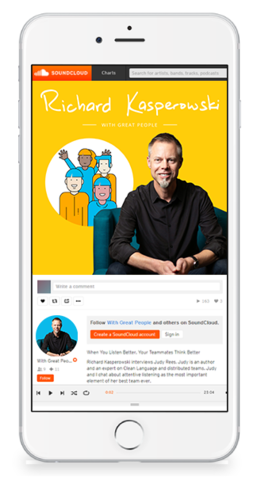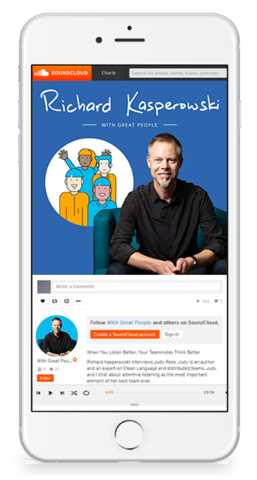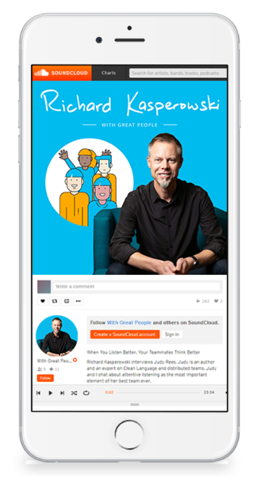Categories
Luke Hohmann: How Being Happy with Who You Are Makes You Feel Wonder for Who You Can Be
In this episode, Richard interviews Luke Hohmann. Luke is the founder and CEO of FirstRoot, the company on the mission to create the next generation of impact investors. He is also an inspiring public speaker and the creator of Innovation Games. Luke tells us how to recognize whether a team is a team we want to stick with and how self-appreciation can help us on this quest.
When you finish listening to the episode, connect with Luke on LinkedIn and visit www.firstroot.co.
Watch video
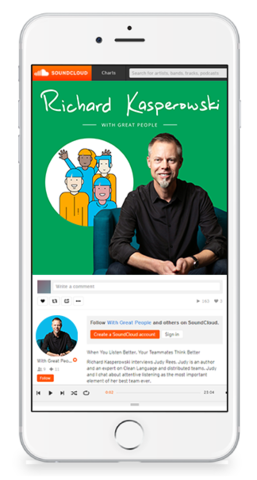
Listen Audio
Luke Hohmann: How Being Happy With Who You Are Makes You Feel Wonder for Who You Can Be
with Luke Hohmann
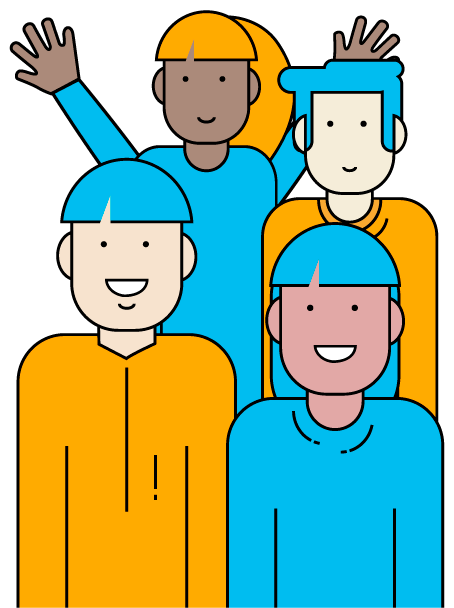
TRANSCRIPT
Richard:
Hi, friends, and welcome back to With Great People, the podcast for high performance teams. I’m Richard Kasperowski. Our special guest today is Luke Hohmann. So I know Luke first as the creator of “Innovation Games” and as a super inspirational keynote speaker. I also know him as a person who figured out how to do grassroots collaborative decision making at really, really large scale, like at the scale of a city of a million people. To support this podcast, visit my website, kasperowski.com.
Richard:
Hey, Luke, it’s so good to see you, my friend.
Luke:
It’s so great to see you, hi.
Richard:
Hi, so, is there anything, I’m sure there’s we’re going to talk about the stuff I just introduced you as, and I’m sure there’s more, what else could we say about you? How else would you introduce yourself?
Luke:
Oh, well, I’m a husband, I’m a father. I am a geek and I’m an extroverted geek, which means I look at your shoes when I’m talking to you. And I love what we do. I think even when people may or may not agree with me on some of my thoughts, I think where we come together is people know how much I love what we do and how committed I am to this field that we call Agile and how much I love it.
Richard:
Yeah, yeah. And I think this is part of why we’re friends. I don’t know if it’s like a charisma, or I just decided I like you, you just decided you liked me. I don’t know what it was but it’s this.
Luke:
I mean, my kids have a joke with me, right? They’ll say, dad, “Why do you love mom?” And I smile, and I say, “Well, if you give a reason, it’s not love, is it?”
Richard:
Yeah, see, it’s perfect, just that. So, this podcast, we were chatting before we started recording the episode. This podcast is about teams. You just mentioned one of your teams, or a couple of your teams, your family, your kids, your wife. I’d like to ask guests about the best team that they’ve ever been a part of in their life. So this could be a team, any group of two or more people, aligned with shared goals. This could be a work team, a not work team, like your wife and kids, a temporary team, like some of the things we’ve done together, like the San Jose Budget Games that was a temporary team, sports team, music group, anything. What’s the best team that you’ve ever been a part of in your life?
Luke:
And I have to admit to everyone, that question really stumps me, because I’ve been a part of so many wonderful teams that it’s hard to actually assert that any one of them was the best, because it’s kind of like Jerry Weinbergen quality attributes. What is the attribute that you would define? If you would define longevity, then the best team I’ve ever been a part of is my best friend, Dan O’Leary. And you remember meeting Dan. He was the chief technology officer at Innovation Games in Cantecko. And, but we, what most people don’t know is Dan and I started to work together at Electronic Data Systems in 1986. So, we’ve been together or for a very long time doing various things. If we defined the team as the best work team, I was a part of where we accomplished, like these amazing goals. It would be, one of them would be, Dan was a great team, just me and him, but others would be at Electronic Data Systems, or at a company called Object Space, where I ran training for a consulting firm. And we had a great set of trainers. Other teams were at Origin Systems, which was the world’s first data warehouse for patent portfolio data. And that was an amazing team. So like, there’s this stream of teams. When I was on the safe, I was on the Safe Framework team. So, the Safe Framework is not written by Dean, it’s written by a group of people. Dean’s the chief methodologist. And he kind of serves a conceptually unifying role for all the opinions, but the five people on the Safe Framework team was just extraordinary teamwork. And so there’s so many best teams ever. I’ll give you the analogy that I’m thinking in my mind right now, is I do a lot of work with data. I am a geek and my kind of area is data modeling and data warehousing and things like that. And when you look at data, there are attributes of quality, right? There’s timeliness, precision accuracy, breadth, depth, perishability, which is often associated with timeliness. And so, we pay, for example, for speed and high speed stock trading data. And in our credit scores, we pay for accuracy. So, well, which is the best data? I don’t know, what’s the purpose? But, well, I’ve been a part of fantastic teams, and lots of fantastic teams over the years. I would say that I don’t remember the bad teams very much. And the reason why is, ’cause I don’t put up with that crap. And I never have, and when there was a bad team, I do remember one bad team that was awful. And I was on it for four months and I was like, I’m out of here. This is dumb, it was awful.
Richard:
All right, I want us to dive into at least one of these teams and start to, to share some of the characteristics of one of these teams. So, you don’t have to tell me, you’re going to eventually tell me which team we’re talking about.
Luke:
Why don’t we talk about the current team I have right now at First Root, which I think is pretty special, so.
Richard:
What is First Root?
Luke:
Yeah, so what we’re doing at First Root is we’re taking the concept of participatory budgeting, which we’ve used it, as you pointed out, at city scale, to help citizens or residents of a city set the city budget. We’ve used it at large enterprises to help set portfolio budgets. The companies like BMW or Salesforce or whatever. And I started doing it in schools, walking up into schools with real money, put into the hands of kids. And from there supporting those kids, as they decide how to spend that money to make their school better. And in the process, teaching them financial literacy, teaching them design thinking, and giving them what they desperately need, and what our society desperately needs, which is a positive civic experience, an invitation to democracy itself in a way that’s meaningful because our democracy is hurting right now. And I feel compelled to do what I can to try and help heal it. So we’ve got a team at First Root, and so I think one of the things that helps us create that great team is we’ve got an inspiring commitment vision, meaning even the developers who are on the team or who are the people in the company who aren’t parents, they care about kids, and you don’t have to be a parent to care about kids, right? You just have to be a person, I don’t know, you have to have a soul.
Luke:
But we have a big goal. And that big goal is inspiring because we disagree. And, when there’s disagreements and frictions, as there always is, you have a mechanism that pulls you together, which is bigger than you. You can point to something instead of pointing to each other or at each other, you can both point to the same thing in the future. And that helps a lot.
Richard:
All right, this sounds awesome. As you think about this team, you know, people who are watching, people will also be listening without video, people who are watching, we can see your face and the energy as you talk about it. What does it feel like within you, as you think about working with this group? And what word would you use to describe that sensation within you?
Luke:
The word that the sensation that feeling, you feel anticipation of what the day will bring. My wife, we’ve been married now 23 years. And I remember, I don’t know, a few years ago we were joking with some friends at a dinner party, and I said something like, I don’t know, does your wife hit you in the middle of the night? They start laughing. They’re like, what do you mean? I’m like, oh, I’ll be sleeping in the middle of the night. And then I’ll fear her like, kind of like, not hit me hard, but she, like, she like taps me and I’m like, what did I do wrong? And then she says to our friends, she says, I’m not hitting him. I’m wondering if he’s still in bed. Because when he gets excited about his work, he waits until I fall asleep. And then he slips out of bed to go back to work. And he doesn’t think I notice and I roll over, and he is not there and I’m upset with him. And so we start laughing. But I think it’s that sense of excitement that you are choosing to do this thing with these people, and choice is really important to me. I believe, I completely, and for all the people who are listening, I generally reject the idea that especially, if you’re in our field, like if you’re listening to this podcast or you’re an AngelList, if you’re an AngelList, you’re probably capable of getting a job somewhere. So I completely reject the idea that people have crappy jobs. If you have a crappy job leave, like seriously, just get a new job. You can find one with remote work and things like that. And so, I believe that teams are voluntary choices, right? We’re all playing games. And in game theory, one of the highlights of game theory is that it’s a voluntary choice to achieve the obstacle. If you don’t like the game you’re playing, play a different game, right? There’s plenty of them. And so what happens to me is I love the game we’re playing so much that I just want to keep playing.
Richard:
Yeah, some people talk about what are you so excited about that it would get you out of bed in the morning? And you’re like, I’m so excited about it I can’t wait until the morning.
Luke:
Yeah, I can’t wait until the morning. Well, today I had my alarm set at six, and I woke up at five and I’m like, oh, I guess-
Richard:
And here we are. It’s like late morning, my time zone. And to me, it’s super early where you are.
Luke:
Yeah, no, I’ve been awake for a while.
Richard:
All right. This awesome team at First Root, and this idea of anticipating, anticipation of what the day will bring. How do you know it’s a great team? What are the subjective senses of this team? what goes into it?
Luke:
Yeah, how do you know it’s a great team? Well, I mean, one is, I just, I know it’s a great team, ’cause I said it was and I believe it is. And so, it’s great because I said it was great, and it is subjective. I mean to the outside world, we could be stupid and crappy, but to us, we love it. But I think it’s, I think there are behaviors that I like. I think in my career, I’ve had some really wonderful experiences. I spent 10 years of my career working at Electronic Data Systems, which was founded by every, from the history of computer science, a guy named Ross Perot. And it was very successful, but I learned so much about ethics and integrity, and being true to who you are and saying what you say, and following through. Over the years, I’ve had different options. I worked for an Israeli security firm. And so from Israelis, I learned just how you can communicate so directly without being rude, just actually, like, here’s, like here’s how you see things and you’re not rude, but it’s pretty candid. It’s not harmful, it’s not hurtful. It’s just direct. And I think that those are all attributes of teamwork that I really respect, and things that I’ve learned over the years as I’ve gotten older, like I’m better at rooting out, is passive aggressive behavior, or not saying what you mean, or not taking feedback as it’s given, which is a gift. So those are all things that really matter to me.
Richard:
All right, all right. Now how about objectively, some things that people outside of the team could observe, so, objectively, how is First Root a great team?
Luke:
Yeah, we build beautiful software. I mean, it’s beautiful. And I think that it’s it, I’m going to go a little bit into philosophy and ‘Zen in the Art of Motorcycle Maintenance’, which is a really critical book that all good developers should read, but Pirsig talks about intrinsic and extrinsic quality. And so objectively, we believe that you would say that we’re a great team because our software works. It has low bug counts. It’s beautifully designed. We ship, we have some really cool stuff that people talk about. Like, we have our CICD pipeline, and I’m proud that the team has crafted a pipeline. We use Flutter for our client technology, and Flutter creates platform solutions, cross platform solutions. What’s really cool is our pipeline will drop all our targets in every build. So our Android, our iOS, our web targets are built every time, it’s run through our CICD pipeline, it’s run through our tests. It’s not that we’re perfect, right? I said low bug count, not zero, but the team, when a bug is found in the field as often is the case, ’cause it’s awfully hard to simulate every device that kids use to access software, they can jump on it. They can get it fixed. So objectively, we have high degrees of empathy and feedback and then, you wouldn’t know it from the outside, but the code is pretty clean inside. So I think that those are objective measures.
Richard:
That’s objective too, you can measure code quality.
Luke:
Yeah, you can. So our McCabe scores are good and things like that. So, I think that objectively, on certain attributes, now we’re a product company, so, eventually the objective measures will also have to include things like, well, are you profitable? Are you making profit? And how are you making profit? And is it a mechanism that works for society? And I think we’re on track with that.
Richard:
Nice, all right. And what are some of the concrete behaviors that you engage in together that lead to this being such a great team?
Luke:
Well, many times we make Agile more than it is. So, I don’t know if you’ve heard this one from me, but I’ll give you this one. I’ll give this to all the readers. I’ll answer a question with a question. So play along with me and then you’ll see where I’m going. So Richard, my friend, Richard, when you go to the dentist, what does the tell you as the practices for not getting cavities? What should you do?
Richard:
Oh, the dentist tells me, sometimes she asks me leading questions, and she asks me questions like, do you brush your teeth in the morning and at night? Do you floss your teeth at least once a day? Blah, blah, blah, blah, blah.
Luke:
So we know that brushing and flossing prevent or help prevent cavities, and maybe not eating or drinking too much soda. And so then why do people get cavities?
Richard:
Oh, well, it must be because they don’t have souls or something.
Luke:
Right, they question floss, right? So, I’m no longer interested in like going through the, how do we write and develop good Agile software? I don’t know. We decompose epics into features and we decompose features into stories and we organize our work so that we can get to a definition of done or done done. We have tests and we have code quality. So to me, a lot of like Agile is associated with brushing and flossing, is just discipline.
Richard:
Yeah, yeah, it’s very mechanical, yeah, discipline.
Luke:
Learning the habit and buying into the habit because there’s a wonderful little book that if people haven’t read, it’s called ‘The Compound Effect’ and the author talks about how compounding isn’t just financial, although it is financial. It’s in all areas of life, you can have these compounding effects. And I think we’ve all been part of software systems where the teams have adopted these behaviors. And then they realize just how beneficial they are. And then you get this compounding effect of like, wow, if we all just keep writing tests, then it’s not a big deal. But at the end of the sprint, we’ve made a little bit of it better. And at the end of the month, and at the end of this quarter, like, wow, we have this really high quality thing that is, so these concrete behaviors, so, going into concrete behaviors, it’s the stuff that we talk about. We have a definition of done. We have acceptance tests. We have user testing, we have personas, we have, and people can find those things about First Root, right? You can just go to firstroot.co/ux-artifacts, and you can see our personas. You can see our stories and oh, and by the way, and this is a Luke thing, it’s not necessarily an Agile thing. Before there’s a user story, there’s an actual story. So, we write our user experience as graphic novels. And I love, ’cause I love comics. So, we actually have our story as a graphic novel.
Richard:
Wow, is it published? I want to see it.
Luke:
Oh, yeah, it’s at firstroot.co ux artifacts.
Richard:
All right, I got to see it.
Luke:
Yeah, it’s great. So, those are the concrete behaviors. Like there’s you asked for a few them, but I think that there’s several of them, right? We have a DSU, we have a sprint review. We have a sprint planning. We try to make sure that all the work is exposed into the backlog. So we don’t have what I call a black log, which is hidden work. And we have a dream log, which is our aspirations. So we, I will see there’s three logs, right? There’s your backlog, black log and dream log. And two of them are good and one of them not so good.
Richard:
All right. How about advice for listeners and viewers? What can they do to reproduce First Roots success? This team’s success?
Luke:
Makes sure everyone is there by choice. But if you don’t, if you, I mean, we just had a server. One of our server team members contacted me, and then this was a couple of weeks ago. He’s like, hey, Luke, I’m going to be leaving for- And I’m like, that’s great, Eduardo, where are you going? He’s like, oh, you’re not upset? I’m like, no, life’s too short not to do work you love. Where are you going? He’s like, oh, my best friend just started a company. And he recruited me and he’s giving me a ton of equity, and I really want to work with him. And I’m like, Eduardo, why wouldn’t I be happy for you? Why wouldn’t I be happy for you? And so I, my advice for listeners is just make sure everyone’s there by choice. I mean, yeah, they need a salary, pay them fairly. How’s that? Okay, next. Like, okay, that’s really hard, give people fair pay. Oh God, that’s tricky advice. I don’t know what fair is. Okay, go online, do a salary comparison for the job you’re hiring for, start there.
Richard:
Oh dear Luke, you’d be surprised. This is really good advice. And this is new for some, not our listeners and viewers there, they know this.
Luke:
Yeah, they would know this. Anyone who listens to you would know this, they know.
Richard:
What else could we add on? Is there anything else you want to add? Anything else about the work at First Root? Anything else that you’re excited about and want to share? What else is happening?
Luke:
Well, I do believe that… we work best at the edge of finding a way to push yourself and a sense of wonder a sense of learning, a sense of something that you have to do better. And so, I periodically, will sit down and write down what I think we’re doing well, and of course this is part of reflection, but reflection also is personal reflection and retrospective. So I’ll write down what I think we’re doing well. And then I’ll write down like, where can we push ourselves, and where can I do better? So, I think that anything else to add is you should be happy with who you are. And then you should be in a sense of wonder for who you can be.
Richard:
That’s such a great sentence. There might be a podcast title there. Well cool.
Luke:
I think it’s too long for the podcast.
Richard:
You’d be surprised. We got to tweak those SES scores.
Luke:
Oh, yeah, oh, yeah. By the way, that’s one of my learnings. One of the areas where I’ve really learned is modern telemetry and marketing. In the past, I really thought that when we were building our telemetry, and our systems, it was more about like, ’cause I’m a geek, I’m like, I need server logs to tune my performance on the scale. Right? And then you start realize, wait a minute, I can use those server logs to figure out where people are using features, and where they’re struggling, and where they’re- And I’m like, oh, wait a minute. And so, I’ve been having a lot of fun exploring event streams, and realizing how much you can do with telemetry and then, the interaction with modern marketing systems, and modern personalization systems. It’s kind of cool.
Richard:
It’s so cool.
Luke:
It’s so cool.
Richard:
It’s so cool. Hey, how could people get in touch with you if they wanted to? If they wanted to share an idea or ask a question.
Luke:
Yeah, I’m distressingly easy to find. I do hang out on LinkedIn so you can get me Luke Hohmann, you know, just search my name, Luke Hohmann, or just go to First Root, firstroot.co. They can send an email to Luke.Hohmann@firstroot.co, but I’m pretty accessible.
Richard:
All right. Well, Luke Hohmann, thank you so much for joining us today. This has been super fun. It’s always great reconnecting, thank you.
Luke:
Thank you for having me.
Richard:
It’s been a pleasure, and listeners and viewers, remember to support this podcast, visit my website, kasperowski.com.



